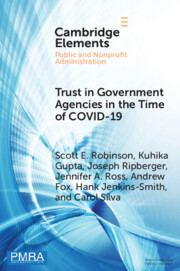References
Arnold, Peri E. 1998. Making the Managerial Tendency. Lawrence: University of Kansas Press.
Kevin K., Banda, and Kirkland, Justin H. 2018. “Legislative party polarization and trust in state legislatures.” American Politics Research 46(4):596–628.
Berrens, Robert P., Bohara, Alok K, Jenkins-Smith, Hank, Silva, Carol, and Weimer, David L. 2003. “The advent of Internet surveys for political research: A comparison of telephone and Internet samples.” Political Analysis 11(1):1–22. http://pan.oxfordjournals.org/content/11/1/1.short. Campbell, Angus, Converse, Philip E, Miller, Warren E, and Stokes, Donald E. 1960. The American Voter. Chicago, IL: University of Chicago Press.
Carpenter, Daniel. 2014. Reputation and Power: Organizational Image and Pharmaceutical Regulation at the FDA. Princeton, NJ: Princeton University Press.
Carpenter, Daniel. 2019. “La réputation organisationnelle de l’état fédéral dans un contexte général de malaise politique.” Revue francaise d’administration publique 170 (2):385–396.
Chanley, Virginia A., Rudolph, Thomas J, and Rahn, Wendy M. 2000. “The origins and consequences of public trust in government: A time series analysis.” Public Opinion Quarterly 64(3):239–256.
Citrin, Jack. 1974 a. “Comment: The political relevance of trust in government.” American Political Science Review 68(3):973–988.
Coleman, James S. 1994. Foundations of Social Theory. Cambridge, MA: Belknap Press.
Easton, David. 1953. The Political System: An Inquiry into the State of Political Science. New York: Knopf.
Eiser, J. Richard, Stafford, Tom, Henneberry, John, and Catney, Philip. 2009. “‘Trust me, I’m a scientist (not a developer)’: Perceived expertise and motives as predictors of trust in assessment of risk from contaminated land.” Risk Analysis: An International Journal 29(2):288–297.
Fukuyama, Francis. 1996. Trust: Human Nature and the Reconstitution of Social Order. New York: Simon and Schuster.
Gershtenson, Joseph, Ladewig, Jeffrey, and Plane, Dennis L.. 2006. “Parties, institutional control, and trust in government.” Social Science Quarterly 87(4):882–902.
Green, Jane, and Jennings, Will. 2017. The Politics of Competence: Parties, Public Opinion and Voters. New York: Cambridge University Press.
Hardin, Russell. 2002. Trust and Trustworthiness. New York: Russell Sage Foundation.
Hetherington, Marc J. 2005. Why Trust Matters: Declining Political Trust and the Demise of American Liberalism. Princeton, NJ: Princeton University Press.
Hetherington, Marc J., and Nugent, J. D.. 2001. “ Explaining public support for devolution: The role of political trust.” In What Is It about Government that Americans Dislike, ed. Hibbing, John R. and Theiss-Morse, Elizabeth pp. 134–151. Cambridge: Cambridge University Press.
Keele, Luke. 2005. “The authorities really do matter: Party control and trust in government.” Journal of Politics 67(3):873–886.
Kettl, Donald F. 2019. “From policy to practice: From ideas to results, from results to trust.” Public Administration Review 79(5): 763–767.
Levi, Margaret. 1998. “A state of trust.” Trust and Governance 1:77–101.
Listhaug, Ola, and Jakobsen, Tor Georg. 2017. “Foundations of political trust.” In The Oxford Handbook of Social and Political Trust, ed. Uslaner, Eric M, pp. 559–578. New York: Oxford University Press.
Miller, Arthur H. 1974. “Political issues and trust in government: 1964–1970.” American Political Science Review 68(3):951–972.
Newton, Kenneth, Stolle, Dietlind, and Zmerli, Sonja. 2018. “Social and political trust.” In The Oxford Handbook of Social and Political Trust, pp. 961–976. New York: Oxford University Press.
Norris, Pippa. 2001. Digital Divide: Civic Engagement, Information Poverty, and the Internet Worldwide. Cambridge: Cambridge University Press.
Putnam, Robert D. 1993. Making Democracy Work. Princeton, NJ: Princeton University Press.
Putnam, Robert D. 2001. Bowling Alone: The Collapse and Revival of American Community. New York: Simon and Schuster.
Roberts, Alasdair. 2020. “Who should we count as citizens? Categorizing people in public administration research.” Public Administration Review 81(2):286–290.
Robinson, Scott E., Stoutenborough, James W, and Vedlitz, Arnold. 2017. Understanding Trust in Government: Environmental Sustainability, Fracking, and Public Opinion in American Politics. Milton Park, UK: Taylor & Francis.
Robinson, Scott E., Ripberger, Joseph T, Gupta, Kuhika, Ross, Jennis A, Fox, Andrew S, Jenkins Smith, Hank C, and Silva, Carol L. 2020. “The relevance and operations of political trust in the COVID-19 Pandemic.” Public Administration Review. https://doi.org/10.1111/puar.13333. John T., Scholz, and Lubell, Mark. 1998. “Trust and taxpaying: Testing the heuristic approach to collective action.” American Journal of Political Science 398–417.
Siegrist, Michael, Cvetkovich, George, and Roth, Laudia. 2000. “Salient value similarity, social trust, and risk/benefit perception.” Risk Analysis 20(3):353–362.
Uslaner, Eric M. 2002. The Moral Foundations of Trust. New York: Cambridge University Press.
Uslaner, Eric M. 2018. The Oxford Handbook of Social and Political Trust. Oxford: Oxford University Press.
Wolak, Jennifer. 2020. “Why do people trust their state government?” State Politics & Policy Quarterly 20(3):313–329.
Wolak, Jennifer, and Palus, Christine Kelleher. 2010. “The dynamics of public confidence in US state and local government.” State Politics & Policy Quarterly 10(4):421–445.





